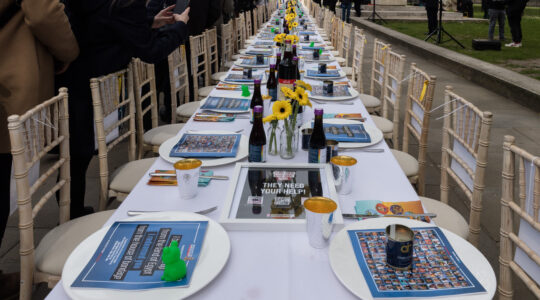TEL AVIV (JTA) — Gadi Taub rests one hand on an oversized brown envelope that contains the galley proofs of yet another book — this time a two-part collection of essays. In the other hand he holds what came in the day’s mail — the just-published English version of his newest book, “The Settlers and the Struggle over the Meaning of Zionism.”
Taub, 45, an author, historian and newspaper columnist, is not your typical Israeli social critic. He is a former host of children’s TV programs. He quotes Alexis de Tocqueville and John Dewey. He sports a pair of silver hoop earrings. He’s a best-selling novelist; his first, titled “Allenby,” was about the seedy underside of Tel Aviv life and was set in strip clubs. And in a country where opinion makers tend to pick a political camp and stick with it, Taub has consistently criticized the post-Zionists of the left as well as the ultranationalists on the right.
These days he’s preaching a 21st century version of doom for Israel — lest, he says, its leaders and people wise up, not only to the dangers of a potentially nuclear Iran but, as he sees it, the self-destructive settlement policy in the West Bank.
“The most pressing problem with the settlements is not that they are obstacles to a final peace accord, which is how settlement critics have often framed the issue. The danger is that they will doom Zionism itself,” Taub wrote in an Op-Ed in The New York Times at the end of August.
“If the road to partition is blocked, Israel will be forced to choose between two terrible options: Jewish-dominated apartheid or non-Jewish democracy. If Israel opts for apartheid, as the settlers wish, Israel will betray the beliefs it was founded on, become a pariah state and provoke the Arab population to an understandable rebellion. If a non-Jewish democracy is formally established, it is sure to be dysfunctional.”
Sitting on the back patio of a favorite Tel Aviv bistro called Orna and Ella, the end of Israel seems far off amid the clattering of dishes and cream-colored linen tablecloths. It was here and at another trendy Tel Aviv restaurant that Taub wrote “The Settlers” in both Hebrew and English.
The book reads like something of a call to action, a plea for Israelis to wake up and realize what he says is the disaster of the settlement enterprise. To achieve that aim, he weaves history with journalistic-style anecdotes, always hitting on the same theme: that settlement stands in direct opposition to Zionism’s goal of creating a viable, independent Jewish state.
Taub says he hopes his fellow countrymen “get it” even if Israel’s current leaders do not.
“These are the people of yesterday not because of their age — they are not old — but they are backward looking,” he said of the Israeli government. “What Netanyahu is trying to do is cling to the status quo, and there is no such thing as status quo in politics. They seem not to understand the most critical dangers Israel is facing. Settlement is going to sink us into a binational condition with an Arab majority and this will not be a Switzerland. This will be a Lebanon.”
The Jewish people’s right to self determination can only be secured in an area where there is a Jewish majority, he says.
Taub’s own Zionism runs deep in a family where his maternal grandparents were chalutzim, pioneers of Israel. They came from Poland to what was then British Mandate Palestine in 1920 to help be among the founders of a Jewish homeland. Taub’s grandmother split stones to pave roads in the Galilee, and his grandfather worked draining the swamps of Palestine.
His father was a refugee from pre-Holocaust Europe, fleeing on a boat of illegal immigrants to Palestine in 1939. Nearly a decade later he was wounded during Israel’s War of Independence, losing several fingers in an incident that effectively ended his professional days as a blacksmith. He later turned to the study of economics, working as a government economist and eventually rising to become No. 2 at the Bank of Israel.
It was his father, whom he describes as an “ardent Zionist,” who most influenced his Zionism, Taub says. He recalls as a boy in the 1970s and listening to his father discuss a settler evacuation from the West Bank.
“He said the settlers were going to be a terrible danger, and I remember not understanding what he meant but that it frightened me,” said Taub, who grew up in Jerusalem.
For all his criticism of the settlement enterprise, Taub does not let the Israeli left off easy. The problem with the Israeli left, he says, is that their disgust with occupation has morphed into disgust with Zionism itself.
“Everything that smacks of national sentiment seems to them to be fascistic,” he said. “They only speak in terms of individual human rights while their disgust with Jewish national sentiment has marginalized them.”
The prolific Taub, who teaches in the communications department of Hebrew University, has written 11 books. Several are for children, but even those books seem to have a social message.
One of them, “The Giraffe Who Liked to Feel Sorry for Himself,” was written upon his return from the United States, where he spent four years studying for his doctorate in American history at Rutgers University. It was a response, he said, to the American exhortation to be cheerful and upbeat.
Despite his tendency to harp on bleak predictions for the future, Taub insists his message comes from a positive place: imagining bringing the settlers back into the fold and into his vision of history as it should be played out.
“I don’t want to get rid of the settlers but bring them back home, ideologically and physically,” he said. “I am against the settlements because I am a Zionist, not because my Zionism has weakened.
“I want a persistent type of Zionism which first of all requires to draw borders in such a way that we preserve a Jewish majority and secondly believes in the right of all peoples to self determination. It is inconsistent that we demand that right for ourselves because it’s universal and then deny to another people.”





